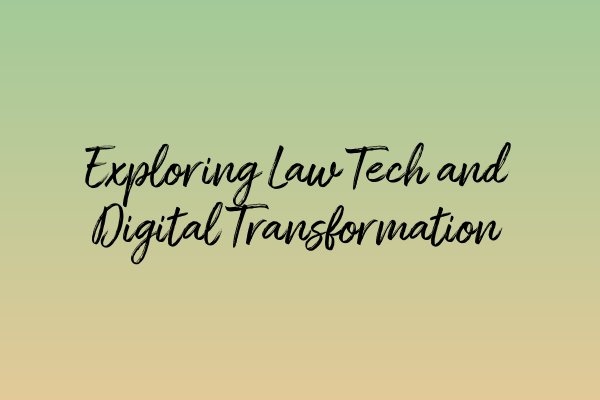Exploring Law Tech and Digital Transformation
In today’s modern world, technology has permeated almost every aspect of our daily lives. From smartphones to smart homes, it’s hard to find an industry that hasn’t been touched by the advancements of technology. The legal industry is no exception, with law tech and digital transformation revolutionizing the way legal professionals practice law and deliver services to their clients. In this article, we will explore the various ways in which law tech and digital transformation are reshaping the legal landscape.
The Rise of Artificial Intelligence (AI) in Law
One of the most significant advancements in law tech is the integration of artificial intelligence (AI) into legal processes. AI has the potential to significantly enhance efficiency, accuracy, and cost-effectiveness in legal practice. Through the use of machine learning algorithms, AI can analyze vast amounts of legal data to identify patterns, predict outcomes, and provide valuable insights to legal professionals.
For example, AI-powered legal research platforms can process and analyze large volumes of case law, statutes, and legal opinions within minutes, saving lawyers valuable time and effort. Additionally, AI chatbots are being utilized by law firms to provide instant legal advice and guidance to clients, improving accessibility and responsiveness.
Furthermore, AI can assist in contract review and analysis, helping lawyers identify any potential risks or inconsistencies in contracts with remarkable speed and accuracy. By automating mundane and repetitive tasks, AI allows legal professionals to focus on higher-value work, such as strategic planning and client counseling.
Blockchain Technology and Legal Transactions
Blockchain technology, most commonly known for its application in cryptocurrencies like Bitcoin, is also finding its way into the legal industry. The decentralized and secure nature of blockchain makes it an ideal tool for recording and validating legal transactions.
Smart contracts, which are self-executing contracts with terms and conditions directly written into code, are a prime example of blockchain technology in action. These contracts automatically facilitate, verify, and enforce the performance of an agreement without the need for intermediaries. They are transparent, tamper-proof, and can streamline complex legal processes, such as property transfers, international transactions, and supply chain management.
Moreover, blockchain technology can enhance trust and transparency in legal processes. Immutable records stored on the blockchain can provide undisputed evidence, reducing the need for costly and time-consuming litigation. Additionally, blockchain-based platforms can ensure the secure sharing of confidential legal documents while maintaining privacy and data integrity.
Virtual Reality (VR) in Legal Education and Dispute Resolution
Virtual reality (VR) technology is being increasingly utilized in the legal industry, particularly in legal education and dispute resolution. VR can create immersive and interactive learning experiences for law students, allowing them to visualize complex legal concepts and engage in realistic simulations.
In the realm of dispute resolution, VR technology offers the potential for remote mediation and arbitration. Parties can participate in virtual environments, facilitating communication and negotiation without the need for physical presence. This saves time, reduces costs, and increases accessibility, particularly in cross-border disputes.
Furthermore, VR can be utilized in courtroom presentations to enhance the understanding of complex evidence and recreate crime scenes for juror visualization. This technology has the potential to make legal proceedings more engaging, memorable, and ultimately, more effective.
The Ethical Implications of Law Tech and Digital Transformation
While law tech and digital transformation offer numerous benefits and opportunities for the legal industry, they also raise ethical concerns that must be addressed. As technology becomes an integral part of legal practice, lawyers must navigate the ethical challenges that arise.
For instance, the use of AI in decision-making processes raises questions of transparency, accountability, and bias. Legal professionals must ensure that the algorithms and data used by AI systems are fair, reliable, and unbiased. Additionally, the safeguarding of client confidentiality and privacy in a digital world is paramount. Law firms must implement robust cybersecurity measures to protect sensitive client information from breaches and unauthorized access.
In conclusion, law tech and digital transformation are revolutionizing the legal industry. The integration of AI, blockchain technology, and VR is enhancing the efficiency, accuracy, and accessibility of legal services. However, these advancements also bring forth ethical considerations that must be carefully addressed. As the legal industry embraces technology, it must do so with a mindful approach that upholds the core principles of justice and fairness.
Related Articles:
- SQE Prep: Tips and Tricks to Excel in Criminal Law
- Cross-Examination Techniques: Mastering the Art of Questioning
- Private Prosecutions: Exploring Non-Governmental Prosecutions in Criminal Cases
- Ethical Challenges in Criminal Defence: Navigating Dilemmas
- Assault and Battery Laws: Understanding the Legal Parameters


Leave a Reply